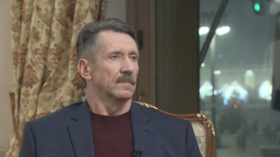Viktor Bout reveals toughest challenge of prison life

In his first major TV interview in over a decade, Russian businessman Viktor Bout has told RT that not being able to talk to his friends and family was the “biggest challenge” of his time in a US prison. Bout described the American prison system as a machine purpose-built to “break a person’s will.”
He returned to his home country this week after being exchanged for basketball star Brittney Griner in a high-profile prisoner swap between Washington and Moscow. He had spent 12 years behind bars in the US as part of a 25-year arms-trafficking sentence, although he always denied the charges against him.
While incarcerated in New York’s Metropolitan Correctional Center during his trial in 2011, Bout recalled how prisoners had their cell windows blocked, with a constant and “poisonous” white light replacing daylight.
“They deprive you of everything,” he said, describing the jail as a “Nazi”-inspired institution built to “break a person’s will.”
“The biggest challenge was not being able to communicate with my loved ones,” he said, adding that he was entitled to “just one phone call per month,” which he often had to use to speak to his lawyers. “The fact that I could not talk to my friends and my family, this was the biggest challenge.”
“The only way to cope was to say, ‘If I panic, what good will it be?’” he told RT’s Maria Butina, herself a veteran of the US penal system.
Bout turned to reading and learning foreign languages, and said he would start every day by laughing out loud for five minutes in order to stave off depression. “This is a game and when you treat it as a game, it turns everything upside down,” he said, claiming that his strategy would infuriate his captors.
“When they see that you’re not going mad… sometimes they don’t bring you a meal, they don’t turn off the light,” he recalled.
Bout described the prison food as inedible, saying he was better fed during his initial two years in a prison in Thailand. “I lost interest in food” in the US, he said. “I was getting thinner and thinner.”
Bout said he eventually forced himself to eat, viewing his meals as another battle against a system designed to break him. “If I’m sick and weak, if they break me, this won’t help anyone,” he explained.
Now with his wife, Alla, Bout said he credits his release to “the support of you all” in his home country, and the principle that, as Russians, “we don’t leave our own behind.”












